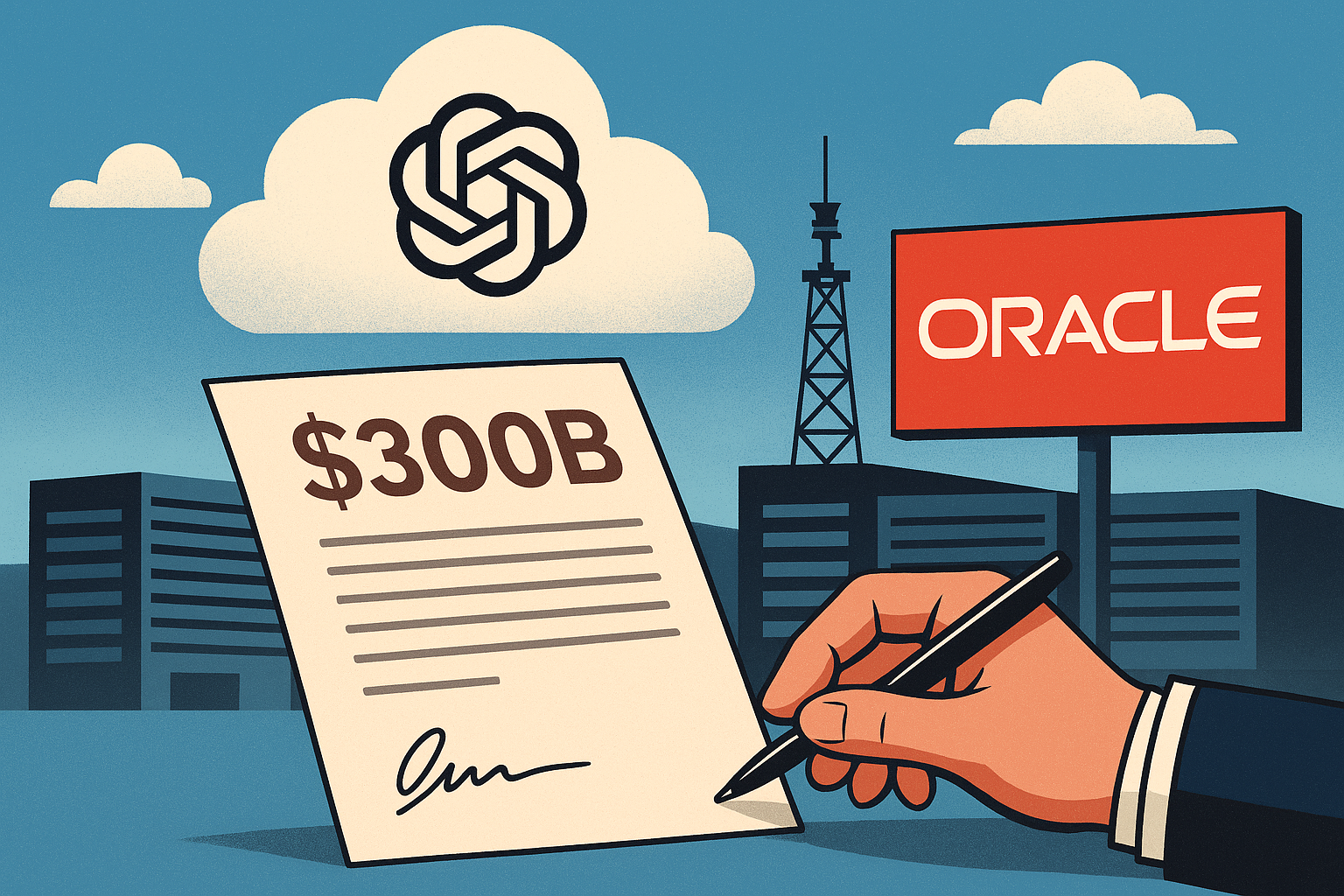The global race for artificial intelligence dominance just escalated. In one of the largest technology contracts ever signed, Oracle has secured a roughly $300 billion cloud infrastructure agreement with OpenAI over the next five years, according to reporting by The Wall Street Journal. The deal not only reshapes the competitive landscape of cloud computing but also signals the immense capital required to fuel generative AI’s next phase of growth. For investors, this is more than a headline—it’s a roadmap to where the next trillion-dollar opportunities may emerge.
Why This Deal Matters Now
The agreement arrives at a moment when computational power is the new oil in global markets. OpenAI, backed heavily by Microsoft, has been aggressively expanding its need for data centers and high-performance compute resources to support the exponential adoption of ChatGPT, GPT-powered enterprise tools, and AI agent frameworks.
By bringing Oracle into the fold, OpenAI is diversifying its infrastructure dependencies while ensuring redundancy, scalability, and geopolitical balance in its supply chain. For Oracle, this deal represents its boldest move yet to capture market share from cloud rivals Microsoft Azure, Amazon Web Services (AWS), and Google Cloud.
Market watchers note that AI infrastructure demand is ballooning. McKinsey recently estimated that AI could generate up to $4.4 trillion in annual global economic value, with a disproportionate share captured by companies owning the compute backbone.
Strategic Analysis: Oracle’s Bid for Relevance
Oracle has long been perceived as a second-tier player in the cloud space, trailing AWS, Microsoft, and Google. This contract is a game-changing strategic win, positioning Oracle as a direct enabler of AI’s most powerful and commercially adopted applications.
Analysts suggest that this deal could double Oracle’s cloud revenue growth trajectory, which already hit 20% year-over-year in its most recent earnings report. By securing OpenAI as a flagship client, Oracle gains brand credibility and a guaranteed flow of hyperscale demand that could stabilize and expand its data center footprint globally.
Moreover, the size of the deal suggests a fundamental shift: cloud providers may increasingly be judged less on the breadth of their enterprise client base and more on the depth of single anchor contracts tied to generative AI workloads.
Future Trends to Watch
1. Rising Competition for AI Infrastructure
The Oracle–OpenAI agreement highlights a broader scramble among cloud providers to secure anchor tenants. Expect AWS, Microsoft, and Google to respond with equally massive contracts or strategic acquisitions to keep pace.
2. Data Center Expansion and Energy Demands
Scaling to meet AI workloads will require unprecedented investments in physical infrastructure. Goldman Sachs projects that AI-driven data centers could triple U.S. electricity demand from the sector by 2030. This creates a parallel investment case in utilities, renewable energy, and cooling technologies.
3. Chipmakers and Hardware Beneficiaries
The compute backbone for this deal will heavily rely on Nvidia GPUs and potentially AMD accelerators. Investors should continue to watch semiconductor firms positioned at the center of AI’s supply chain.
4. Regulatory Risks and Oversight
Governments from Washington to Brussels are scrutinizing the concentration of power among AI infrastructure players. While regulation may slow growth, it could also create opportunities for second-tier providers to capture niche market share.
Key Investment Insight
This deal confirms that cloud providers are no longer just enterprise service vendors—they are now the essential infrastructure layer for AI’s global rollout. Investors should watch three areas closely:
- Cloud & Infrastructure Providers: Oracle’s stock could see re-rating if this deal materially shifts its market share outlook.
- Semiconductors & AI Hardware: Nvidia, AMD, and suppliers of networking hardware like Broadcom stand to benefit from the compute boom.
- Energy & Utilities: With soaring data center demand, companies in clean energy, grid modernization, and cooling technology will likely experience rising investor interest.
For portfolios, this is less about betting solely on Oracle and more about recognizing the ecosystem of companies enabling trillion-dollar AI infrastructure build-outs.
Stay Ahead with MoneyNews.Today
As AI transforms not only technology but the very backbone of global markets, investors need to track not just the winners of today but the enablers of tomorrow. Deals like Oracle’s $300 billion contract with OpenAI are reshaping the future of capital allocation.
Stay with MoneyNews.Today for daily investor-focused coverage on AI, cloud, and the industries driving the next era of market growth.





